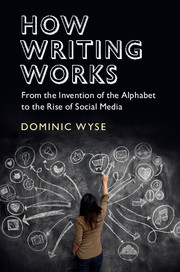Book contents
- How Writing Works
- How Writing Works
- Copyright page
- Dedication
- Contents
- Figures and Tables
- Acknowledgements
- Introduction
- 1 Thinking about Writing and Language
- 2 A History of Writing
- 3 Writing Guidance
- 4 Expert Writers
- 5 Creativity and Writing
- 6 Novice Writers and Education
- 7 The Process of Writing
- Bibliography
- Index
Introduction
Published online by Cambridge University Press: 12 December 2017
- How Writing Works
- How Writing Works
- Copyright page
- Dedication
- Contents
- Figures and Tables
- Acknowledgements
- Introduction
- 1 Thinking about Writing and Language
- 2 A History of Writing
- 3 Writing Guidance
- 4 Expert Writers
- 5 Creativity and Writing
- 6 Novice Writers and Education
- 7 The Process of Writing
- Bibliography
- Index
Summary
Written language is a supreme achievement that distinguishes humans from animals. For many millions of people across the world, being literate gives access to vital parts of social and cultural life, and being illiterate results in more limited opportunities. For employment as an academic, journalist, and of course writer, writing is central to the work. For professional people, writing is a main vehicle for getting work done. For other jobs, writing is vital to efficient practices including health and safety. And for many people, writing as a source of pleasure, recreation, and reflection is what they value most. One thing all writers have in common is the challenge to write well. The challenge for a tiny minority is to reach ‘immortality’ in their writing, but for most people the challenge is making writing effectively reflect the meanings and messages they want to create and communicate. For children, the challenge is learning to write in the first place, and for teachers the challenge is helping their learners to do this. But in spite of the thousands of years of history of writing, and in spite of its global use today, writing has attracted less attention from researchers, particularly compared to oral language and reading.
The beginning of my exploration of writing was informed by both seminal and more recent books written by people with different kinds of relevant expertise, for example by classicists (e.g. Eric Havelock, The Muse Learns to Write), philosophers (Aristotle, On Interpretation), anthropologists (Jack Goody, The Interface between the Written and the Oral), cognitive scientists (Steven Pinker, The Language Instinct), psychologists/educationalists (David Olson, The World on Paper), linguists (David Crystal, The Stories of English), literary/media theorists (Marshall McLuhan, The Gutenberg Galaxy), journalists (Lynn Truss, Eats, Shoots & Leaves), and accounts by writers (Stephen King, On Writing). In answer to a question about the origins of his poems the poet Ted Hughes said:
Well, I have a sort of notion. Just the tail end of an idea, usually just the thread of an idea. If I can feel behind that a sort of waiting momentum, a sense of some charge there to tap, then I just plunge in. What usually happens then – inevitably I would say – is that I go off in some wholly different direction.
- Type
- Chapter
- Information
- How Writing WorksFrom the Invention of the Alphabet to the Rise of Social Media, pp. 1 - 24Publisher: Cambridge University PressPrint publication year: 2017



